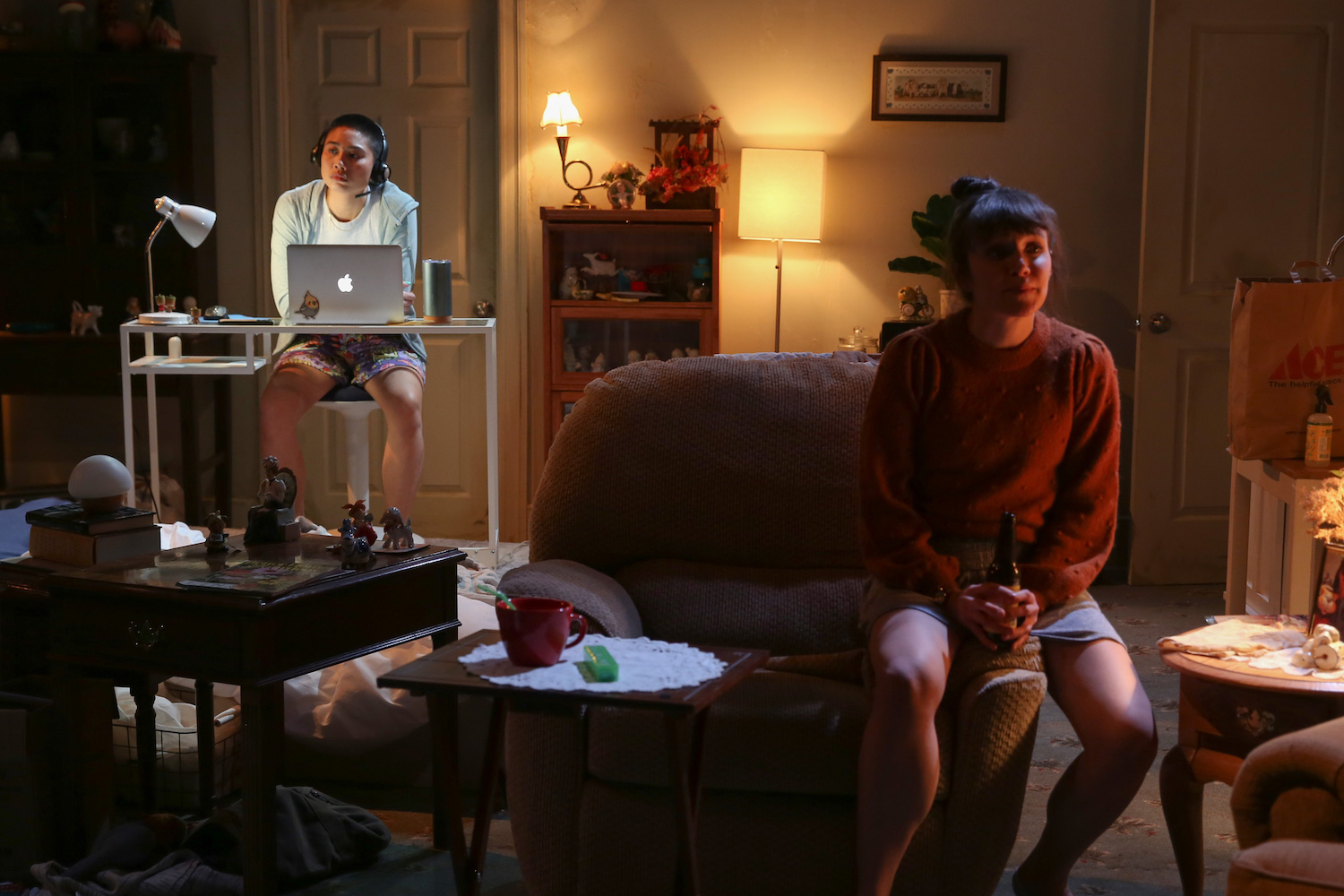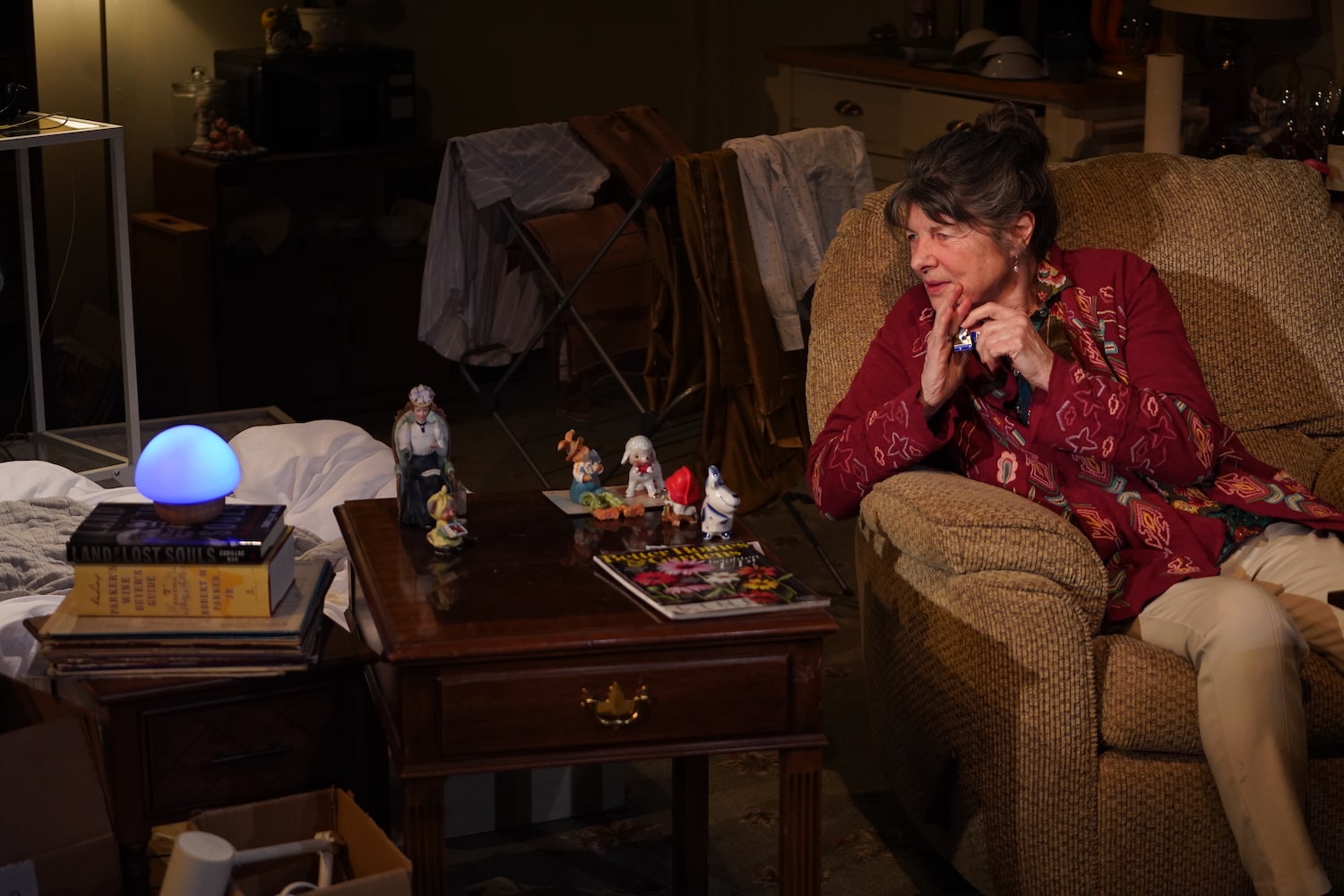In ‘Smart,’ AI And Dementia Intersect Onstage
8:19 minutes
Listen to this story and more on Science Friday’s podcast.

As AI becomes more advanced, it’s also becoming a bigger part of our lives. That’s especially true of smart speakers, which to some of us, act as another member of a family: answering simple questions, reminding us about appointments, and entertaining children. But what parts of our privacy are we giving up to make our lives slightly more convenient?
That’s the focus of a new play called “Smart,” which tells the story of four characters: a woman, played by Kea Trevett, her aging mother who has dementia, played by Christine Farrell, an AI programmer who works for a tech company, played by Francesca Fernandez, and a smart speaker named Jenny, voiced by Sherz Aletaha.

Ira speaks with the writer of “Smart,” Mary Elizabeth Hamilton, about how she wrote the play, how the science behind AI inspired its plot, and the connections between AI hallucinations and dementia-induced hallucinations.
Editorial note: “Smart” was funded by the Alfred P. Sloan foundation, which also helps support Science Friday.
Invest in quality science journalism by making a donation to Science Friday.
Mary Elizabeth Hamilton is the playwright of “Smart.” She’s based in Brooklyn, New York.
IRA FLATOW: Do you have a smart speaker or many smart speakers in your home? As a techno geek, I just have to have one of each to see how they work. I’ve got a Siri, a Google, Alexa, and I’ll have whatever new one comes out.
You know why? Because as AI is becoming more and more advanced, it’s becoming a bigger part of our lives, and that’s especially true about smart speakers, which, to some of us, act as another member of the family, answering simple questions, reminding us about appointments, when to take our meds, entertaining our kids.
But what parts of our privacy are we giving up to make our lives slightly more convenient? That’s the focus of a new play called SMART, which tells the story of four characters, an aging mom with dementia, her daughter who lives with her and is her caregiver, and an AI tech worker who secretly monitors conversations mom and daughter have in their homes through their smart speaker. Their lives become intertwined with a smart speaker called Jenny, the fourth character in this play.
Full disclosure, SMART was funded by the Alfred P. Sloan Foundation, which also helps support Science Friday. Joining me is SMART’s playwright, Mary Elizabeth Hamilton, based in Brooklyn, New York. Welcome to Science Friday.
MARY ELIZABETH HAMILTON: Thank you.
IRA FLATOW: Mary, why did you want to write a play then about tech and smart speakers caring for aging parents?
MARY ELIZABETH HAMILTON: We’d just gotten an Alexa. This was five or so years ago for my partner’s mother, who had dementia caused by a stroke, and it was meant to help her to communicate with her kids, who lived far away. And we had the Alexa in our apartment for a couple of weeks before giving it to her, as we figured out how to use it and how to communicate with her about how to use it. And so I became interested in the ways that these devices can be used to communicate and to help people who are struggling with language and memory issues.
IRA FLATOW: Right, and so much has happened in those years in the AI space since then. We now have ChatGPT. It’s evolving. Did you feel that you needed to update the play as those years went along?
MARY ELIZABETH HAMILTON: Yeah, certainly. It’s funny writing a play about technology because any time at all passes and it pretty quickly feels outdated. So I did try to look into ways that the play could be updated, but yeah, I certainly did read a lot anyway about the new developments with AI and ChatGPT and had a lot of late night conversations with ChatGPT as I was trying and procrastinating writing the play. And it’s fascinating, the ways that it’s changed in just a few years.
IRA FLATOW: Did your questions and responses from ChatGPT make it into the play?
MARY ELIZABETH HAMILTON: Not in any overt way, but at one point, I was struggling with this scene at like 3:00 AM one night. And I was like ChatGPT, could you write me this scene. And I told it the sort of various components, and the characters, and the gist of the conversation, and it wrote this hilariously really– the dialogue is bad, but it’s so funny because it went to the extent of having them have this conversation about tech but also this awkward flirting. And although I, of course, didn’t use ChatGPT’s scene, it sparked a scene that I– a new scene that I did write for the play.
IRA FLATOW: Yeah because you can see that scene where there is awkward flirting going on in–
MARY ELIZABETH HAMILTON: My specialty.
IRA FLATOW: [LAUGHS] And speaking of scenes, one of the staging choices that I love is that you combine different characters’ living spaces, their living spaces, into the same room so that the programmer, whose work involves listening in on the family’s smart speaker, appears to be in the same living room as the woman and her mom. And it really emphasizes that real people sometimes listen in on the conversations you have with the smart speakers.
And there’s been reporting from Bloomberg that backs that up specifically about Amazon’s Echo smart speakers. Did you purposely incorporate it that way, the creative process, make that choice?
MARY ELIZABETH HAMILTON: Yeah, for sure. Our scenic designer, Ant Ma, who’s really wonderful and thoughtful in her choices, and she suggested having what she called like a lighthouse in the middle of their world. And I thought that was a really compelling idea. So yeah, certainly having the two worlds overlap and to the point where it’s hard to distinguish between them was very much a part of the early creative conversations that we had.
IRA FLATOW: You’re listening to Science Friday from WNYC Studios. And I have to also say, watching the scenery change was worth the price of admission alone in that–
MARY ELIZABETH HAMILTON: They did such a great job, didn’t they?
IRA FLATOW: Yeah, it was great. One of the connections the play draws between people with dementia and AI– one of those connections is the hallucinations that can happen in both instances. And now I know that programs like ChatGPT can occasionally spit out responses that are called hallucinations, which may seem factual and are confidently stated, but they’re actually completely false.
And in the play, the mom has dementia-induced hallucinations, where she believes her dead husband is in the room with her and has conversations with him. Let me play a clip of the daughter caregiver Elaine played by Kea Trevett, talking with Gabby, whose job is to listen in on their conversations, played by Francesca Fernandez.
[AUDIO PLAYBACK]
– My mom still has whole conversations with my dad, like he’s in the next room.
– That’s kind of sweet, too, no?
– He’s been dead for eight years. So the AI, they hallucinate all the time, right? And it’s revealing all this stuff about how we construct reality, like how rooted it is in our time and place.
– I’m not sure I think we construct reality. So your mom has this fixed memory of your dad, and maybe it doesn’t match the time she’s living in right now.
– The time we’re all living in right now.
– But that’s constantly being revised by new experiences and memories. Maybe she’s experiencing a different time than you.
[PLAYBACK ENDS]
IRA FLATOW: I thought that was a tremendous moment in the play, Mary. Why did you want to draw that connection?
MARY ELIZABETH HAMILTON: Well, I guess maybe that did come out of a conversation with ChatGPT as well. But in reading more about the AI and the hallucinations, I think it’s– although it’s not literally the same, I don’t think, as the way the human mind works when it’s suffering from dementia or anything else, I think it does open up really interesting questions about how we construct reality, and make meaning, and how rooted it is in our time and place.
And when they’re coming up with these false statements, as you said, my understanding is that they’re just sort of searching through all of this vast amounts of data that they have access to and just coming to the wrong conclusion, which I guess is not dissimilar to how we sometimes have false memories or look through our minds and find the wrong thing at any given point. And the way that then becomes part of the larger conversation about what we all accept as truth in the world seems really interesting to me.
IRA FLATOW: Yeah, you also make the point there that we should accept people with dementia’s realities. Even though they may not match our own, they’re still valid realities for themselves.
MARY ELIZABETH HAMILTON: Sure. It just opens up all these really fascinating ideas to me about– given the place we’re at in the world and how difficult it is seemingly to agree on reality with any two people.
IRA FLATOW: Good point. Do you trust smart speakers? You said you gave your smart speaker away. Do you still have one? Or did you–
MARY ELIZABETH HAMILTON: I do have one. Yeah, my daughter was given a Siri at the start of the pandemic, and it drove me crazy. I hated it. I unplugged it any time she wasn’t home.
But she eventually convinced me in her very persuasive 10-year-old way that it’s not really any worse than my phone, or my computer, or any of these other devices that are just everywhere in our lives. So I came around to it. I now use it to time things or to listen to music, and it is what it is, I guess.
IRA FLATOW: Well, Mary Elizabeth Hamilton, good luck with you on the play.
MARY ELIZABETH HAMILTON: Thank you.
IRA FLATOW: Mary Elizabeth Hamilton, writer of the new play SMART, playing at the Ensemble Studio Theatre in New York City until April 29. Go see it.
Copyright © 2023 Science Friday Initiative. All rights reserved. Science Friday transcripts are produced on a tight deadline by 3Play Media. Fidelity to the original aired/published audio or video file might vary, and text might be updated or amended in the future. For the authoritative record of Science Friday’s programming, please visit the original aired/published recording. For terms of use and more information, visit our policies pages at http://www.sciencefriday.com/about/policies/.
Dee Peterschmidt is a producer, host of the podcast Universe of Art, and composes music for Science Friday’s podcasts. Their D&D character is a clumsy bard named Chip Chap Chopman.
Ira Flatow is the founder and host of Science Friday. His green thumb has revived many an office plant at death’s door.